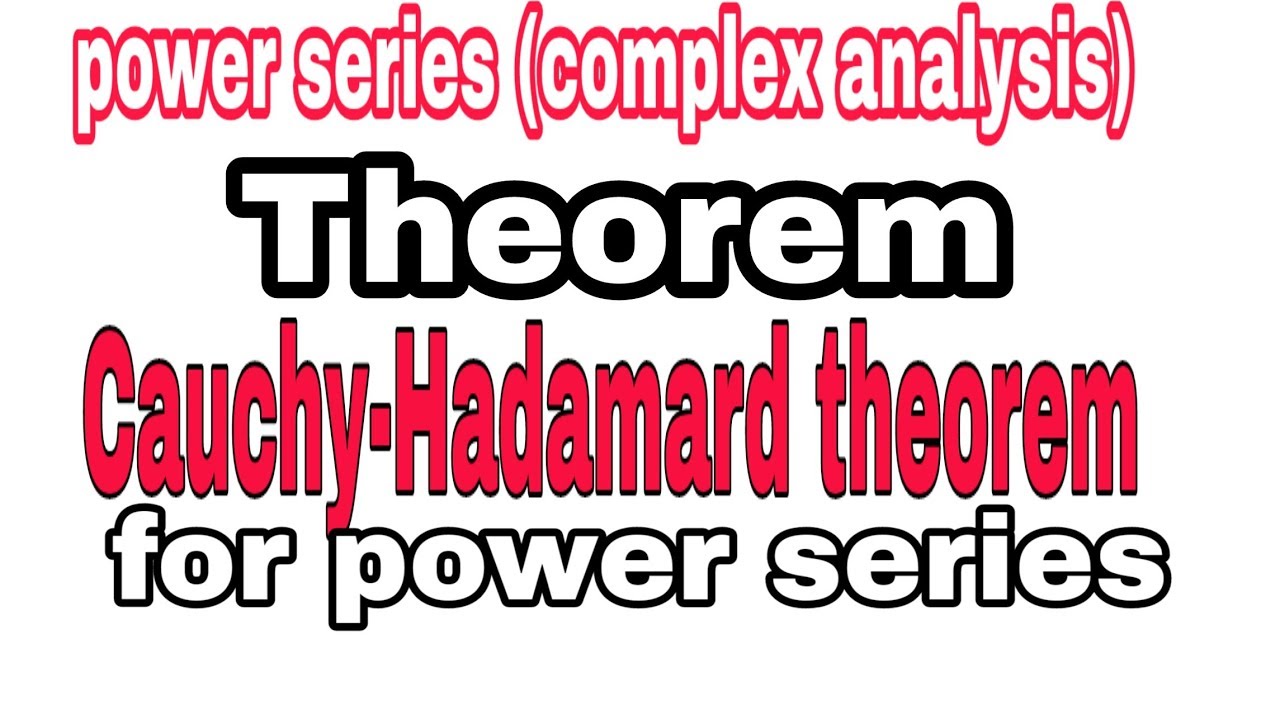Cauchy-Hadamard Test – Mathematics Notes – For W.B.C.S. Examination.
কাউচি-হাডামার্ড পরীক্ষা – গণিতের নোট – WBCS পরীক্ষা।
In mathematics, the Cauchy–Hadamard theorem is a result in complex analysis named after the French mathematicians Augustin Louis Cauchy and Jacques Hadamard, describing the radius of convergence of a power series. It was published in 1821 by Cauchy,but remained relatively unknown until Hadamard rediscovered it.Hadamard’s first publication of this result was in 1888;he also included it as part of his 1892 Ph.D. thesis.Consider the formal power series in one complex variable z of the form.Continue Reading Cauchy-Hadamard Test – Mathematics Notes – For W.B.C.S. Examination.
- {\displaystyle f(z)=\sum _{n=0}^{\infty }c_{n}(z-a)^{n}}
where {\displaystyle a,c_{n}\in \mathbb {C} .}
Then the radius of convergence {\displaystyle R} of ƒ at the point a is given by
- {\displaystyle {\frac {1}{R}}=\limsup _{n\to \infty }{\big (}|c_{n}|^{1/n}{\big )}}
where lim sup denotes the limit superior, the limit as n approaches infinity of the supremum of the sequence values after the nth position. If the sequence values are unbounded so that the lim sup is ∞, then the power series does not converge near a, while if the lim sup is 0 then the radius of convergence is ∞, meaning that the series converges on the entire plane.
Proof of the theorem
Without loss of generality assume that {\displaystyle a=0}. We will show first that the power series {\displaystyle \sum c_{n}z^{n}} converges for {\displaystyle |z|<R}<img class=”mwe-math-fallback-image-inline” src=”https://wikimedia.org/api/rest_v1/media/math/render/svg/60c24dbdb8afa15bfa5c563fa13d29b8fa68899d” alt=”|z|, and then that it diverges for {\displaystyle |z|>R}
First suppose {\displaystyle |z|<R}<img class=”mwe-math-fallback-image-inline” src=”https://wikimedia.org/api/rest_v1/media/math/render/svg/60c24dbdb8afa15bfa5c563fa13d29b8fa68899d” alt=”|z|. Let {\displaystyle t=1/R} not be zero or ±infinity. For any {\displaystyle \varepsilon >0}
Conversely, for {\displaystyle \varepsilon >0}

Several complex variables
Statement of the theorem
Let {\displaystyle \alpha } be a multi-index (a n-tuple of integers) with {\displaystyle |\alpha |=\alpha _{1}+\cdots +\alpha _{n}}, then {\displaystyle f(x)} converges with radius of convergence {\displaystyle \rho } (which is also a multi-index) if and only if
- {\displaystyle \lim _{|\alpha |\to \infty }{\sqrt[{|\alpha |}]{|c_{\alpha }|\rho ^{\alpha }}}=1}
to the multidimensional power series
- {\displaystyle \sum _{\alpha \geq 0}c_{\alpha }(z-a)^{\alpha }:=\sum _{\alpha _{1}\geq 0,\ldots ,\alpha _{n}\geq 0}c_{\alpha _{1},\ldots ,\alpha _{n}}(z_{1}-a_{1})^{\alpha _{1}}\cdots (z_{n}-a_{n})^{\alpha _{n}}}
- For Guidance of WBCS (Exe.) Etc. Preliminary , Main Exam and Interview, Study Mat, Mock Test, Guided by WBCS Gr A Officers , Online and Classroom, Call 9674493673, or mail us at – mailus@wbcsmadeeasy.in
Visit our you tube channel WBCSMadeEasy™ You tube Channel
Please subscribe here to get all future updates on this post/page/category/website



 +919674493673
+919674493673  mailus@wbcsmadeeasy.in
mailus@wbcsmadeeasy.in



































































































![{\displaystyle {\sqrt[{n}]{|c_{n}|}}\geq t+\varepsilon }](https://wikimedia.org/api/rest_v1/media/math/render/svg/2365a1c49e79059b32afb75a51cfec0e6ac95a19)







![\lim _{{|\alpha |\to \infty }}{\sqrt[ {|\alpha |}]{|c_{\alpha }|\rho ^{\alpha }}}=1](https://wikimedia.org/api/rest_v1/media/math/render/svg/8d4d4cf57efbc61b7db63b34f21584f018a3eabb)












